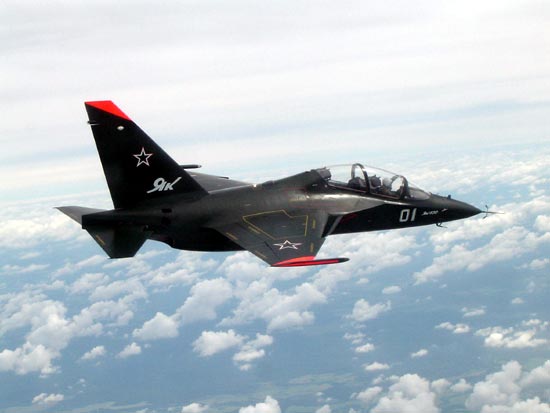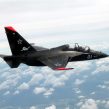
Moscow Ready for a Confrontation with the West Over Syria
Publication: Eurasia Daily Monitor Volume: 9 Issue: 132
By:

On July 9, speaking to Russian reporters at an air show near London, Vyacheslav Dzirkaln, a deputy director of Russia’s Federal Military-Technical Cooperation Service (FSVTS), which supervises the arms trade, announced that Moscow will not be signing new arms trade contracts with Syria or “sending new weapons, while the situation in the country [Syria] is unstable.” “There is a civil war in Syria,” stated Dzirkaln, “Russia, together with other nations, is concerned with the situation.” Last January, an arms contract with Syria worth reportedly some $550 million was signed to sell 36 Yak-130 trainer jets, which can be used as light attack aircraft, particularly in anti-insurgency warfare. Dzirkaln declared the Yak-130 jets will not be shipped to Syria before “the situation there is stabilized” (RIA Novosti, July 9).
The report was greeted with elation by US diplomats in Washington and Moscow as a solid indication of Moscow’s position on Syria finally “changing” against the regime of President Bashar al-Assad. US ambassador to Russia Michael McFaul – former director for Russia and Eurasia on the US National Security Council, considered the architect of President Barack Obama’s “reset policy” of improved US-Russian relations – was reported by the Russian press as making a Russian language tweet: “Excellent news” (Komsomolskaya Pravda, July 9).
It is obviously important for the Obama administration during the present election season in the US to have proof the “reset” is working and that Russia is ready to be reasonable on important international issues. McFaul’s personal political future in Washington, or lack thereof, may be connected to the public success or failure of the “reset.” An arms embargo imposed on the Assad regime would have been a serious development that the Obama administration (and McFaul) could note as a very timely foreign policy accomplishment.
This week, a delegation of the umbrella opposition group Syrian National Council (SNC), based in Turkey and openly backed by Western and Arab states, came to Moscow. The SNC delegation, led by its new chairman, Abdel Basset Sayda, met with officials, including Russian Foreign Minister Sergei Lavrov. Influential senator Mikhail Margelov – a longtime advocate of moving Russian policy away from the doomed Assad regime – called the SNC “the most serious and inclusive opposition organization.” Margelov told journalists that the SNC’s Moscow visit “was the beginning of a dialogue with a real force that could solve the Syrian conflict” (RIA Novosti, July 10). Sayda in turn asked Lavrov to put pressure on Assad in the UN by agreeing to sanctions if the regime continues to use force, but talks in Moscow did not bring any progress: According to Sayda, “Moscow’s position did not change, though dialogue helped [us] to better understand each other” (RIA Novosti, July 11).
There are differing positions in the ruling Moscow elite on how to proceed with Syria. Margelov has, for some time, been the public face of those who believe it is time to distance Moscow from al-Assad and that further arms deals with Syria are not in Russia’s interest – especially considering that Damascus does not have the money to pay for new weapons as the economy is hit by Western sanctions and civil war. There are hawks in the Foreign and Defense Ministries, as well as the intelligence community, in Moscow with long-time connections to the present Syrian military-intelligence establishment. They argue the Syrian regime may still defeat its enemies and that abandoning an old ally is wrong. President Vladimir Putin has strongly promoted a hard line on Syria, apparently seeing the conflict as part of a global US-led conspiracy intent on forcefully changing the regime in Damascus and, after that, possibly in Moscow by supporting the Russian opposition (see EDM July 5).
This week, speaking to leading Russian diplomats and ambassadors gathered for an annual meeting in Moscow from all over the world, Putin used extremely harsh language, describing Western-led “so-called humanitarian operations” as “the export of rocket and bomb democracy.” According to Putin the West is losing its influence in the world and is desperately disregarding international law to regain control (www.kremlin.ru, July 9). Putin’s words were soon reflected in action. Dzirkaln swiftly clarified his statements by announcing that Russia will continue shipping arms to Syria, and the Yak-130 jets are not being sent at present “because they have not yet been assembled; but the work is being done.” There is “no talk of any arms embargo against Syria,” according to Dzirkaln (Interfax, July 11).
In the UN, Russia has announced it will veto a Western-backed resolution that threatens sanctions if the violence in Syria does not cease. Russia put forward its own resolution that extends the UN observer mission in Syria, but does not mention any sanctions. The Russian resolution has been fully supported by Damascus “as balanced” (RIA Novosti, July 11).
The Russia navy is assembling a task force in the Mediterranean: one frigate, two corvettes, five landing craft with Marines on board, two rescue tugs and one tanker. Three of the landing craft are from the North Sea fleet and two from the Black Sea fleet. The number of Marines on board is estimated from 500 to 1,000. The joint flotilla may be deployed “for maneuvers” near Syria for up to three months and may dock in the Russian supply base in Tartus (Syria), though it will mostly be at sea (Interfax, July 11). According to Dzirkaln, the Russian naval task force in the Mediterranean will be given orders “to defend Russian shipping in the event of a naval blockade” (RIA Novosti, July 11). Of course, most of the ships of the Russian task force sent to Syria are of Cold War vintage and do not have effective air cover, but the deployment means Moscow will not only continue arms shipments to Syria, but also provide an armed escort to such shipments to prevent a possible Western-led naval blockade from imposing an embargo. Moscow is, in effect, deploying a trip-wire force to stop the supposed “export of rocket and bomb democracy.” It seems the Obama administration will be forced to live with that, while continuing to pretend the “reset” is bringing real results.




